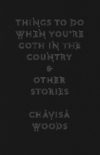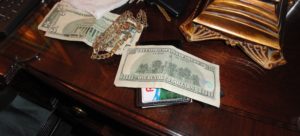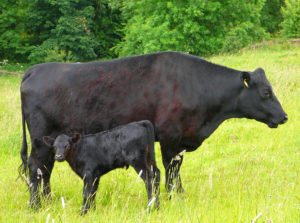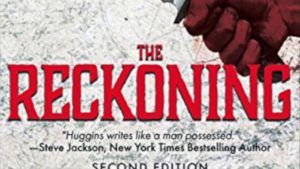The story below by Kathleen Heil first appeared in the Spring, 2016 issue of Green Mountain Review and is reprinted here with author’s permission.
Bird in the Hand
In the plaza where the overgrown puppy blooms there are pigeons looking for food the tourists have left on the benches encircling the open space: cookie crumbs, the heel of a half-eaten bocadillo, the fat from a piece of jamón serrano. It is Holy Thursday in the unholy year 2010, a national holiday in Spain, and the people of Bilbao are on the street, strolling. Puma has come to this city because she thinks she needs to think about what she is doing with her life, it is a question she asks herself everyday, but the answer keeps shifting and at times is hard to locate, she tries to take care of herself, tries to find happiness in the little things, like having found this American sandwich chain at which she hasn’t eaten in years, she orders a turkey sandwich with everything and a chocolate chip cookie, she is relieved to not have to eat another dry-ass bocadillo. After eating the sandwich and picking at the cookie she takes out her sketchpad and notices a boy whom she begins to draw. The boy is shrieking as he chases after the pigeons. His eyes sit loosely in their sockets. His tongue is sticking out; it moves in slow, labored circles. He looks two years too young to be left unsupervised. Nevertheless, the boy appears to be alone.
#
Iñaki and Sara wake up at six twenty-six to the sound of the baby crying. Iñaki thinks that maybe their daughter is hungry, but after five minutes of shrieking she falls back asleep, giving the couple, if everything goes as it usually does, another half hour of peace. The baby will be one year old on Sunday, and neither Iñaki nor Sara can believe that time has flown so quickly. She is their first child, and Sara’s pregnancy was a difficult one: she’d had heart palpitations and terrible insomnia, terrified something would go wrong; already she’d lost two little ones in the early weeks of earlier pregnancies. Sara didn’t know what she would do if it happened again, but she carried the baby to term. They felt lucky. Their daughter was happy, healthy, beautiful.
Iñaki makes the coffee and brings a cup to Sara, who is still half-asleep. He leaves the cup on the nightstand and leans over to kiss her lovely skin. Her veins mark tiny paths across her breasts, and while he kisses her there his fingers run the length of her ribcage, looking for the spaces in between the curving bones. He imagines passing his fingers through her ribcage and touching her from inside, and makes a game of the pressure he puts in his fingertips, looking to strike a perfect balance between pleasure and pain, until, moving his fingers further down, he pushes her hips into the bed and begins to kiss her on her sex.
Sara doesn’t breathe hard or sigh deeply or say, Sí, Sí, or anything like that. Instead she mumbles, If a bird in the hand is worth more than a hundred in flight, how much is the bird in the hand worth if it’s a pigeon which has just crapped on your fingers, and Iñaki laughs because Sara always asks him these philosophy-lite questions when they are about to have sex, and he tells her it’s a distraction but the truth is he likes it, he likes that he can feel her body getting warmer as he listens to her thoughts turn around in her brain, everything is moving, and as he kisses her there she carries on, asking him, How can a pigeon cross the road if one point is A and the other is B but between these two points there are an infinite number of intermediate points, and finally Iñaki puts his tongue inside her until she says, only half-joking, If the universe is infinite then the number of orgasms within it should be, too, and then she takes one for the universe right there on his face, and he comes up to kiss her and he tells her, only half-joking, If the number of orgasms within the universe is infinite then the amount of love within it should be, too, and as he says this he fits his body to hers, and she smiles because she feels him deeply and loves him deeply and she knows that the only constant in the universe is change, and she thinks she needs to think less and then she tells him that she loves him and pulls him deeper into her, hard, and their bodies hold each other there until release, and the baby starts crying as they both cry out.
Iñaki gets up and kisses his daughter’s tiny hands and changes the girl’s diaper while Sara showers. She comes out in a towel and feeds the baby while Iñaki showers, and then the three of them get dressed. It is still early, so they pile up on the bed where they sleep a while longer.
#
Rafa wakes at eleven-fifteen; again he hasn’t slept well; again he looks at himself in the bathroom mirror and staring back at him is a face so swollen he hardly recognizes it as it his own. Rafa is from the Canary Islands but Maite insisted they live in the Basque Country, her son was only going to speak Euskara with her, she said, she wasn’t going to support the State’s fascists and didn’t Rafa know, they were all fascists. Rafa didn’t know, but he loved her so he kept quiet about how different things were on the Peninsula. Sometimes, he would make papas arrugadas con mojo for the three of them, and, dipping the wrinkled potatoes in the spicy sauce, think of home.
Armando is playing his video games; his shrieks can be heard from the master bedroom. The only person there to hear them is Rafa. It’s been two years since the separation and one since they signed the papers. Maite left after falling in love with her gynecologist, which Rafa wanted to find funny, but it was too grotesque. Maite told him she couldn’t handle Armando, said it wasn’t right for her to fulfill the ‘papeles de mujer’ just because she was a woman, gave him a feminist speech that might as well have been some piece of paper, the gynecologist was fucking her and wanted to take her to Miami where his family lived, where he could make more money in private practice, didn’t Rafa know, she didn’t have any other choice, she told him this with a pained look on her face, but her body gave her away: she wanted to get away. She wasn’t going to feel guilty. She was going to be fine, and Rafa was fucked.
Rafa had been working as a real estate agent but since the economic crisis he’s been out of a job. There was, at least, his unemployment check and the government assistance he received for Armando. Maite hadn’t sent any money since she’d left for the U.S., and what was he going to do, drag her across the ocean and take her to court? It wasn’t all bad, he knew that, and things could always be worse, which was terrifying. People loved to remind him of this when he complained: Bueno, es lo que hay. It is what it is. Rafa hated the expression.
After staring at his sorry face in the mirror Rafa goes back to bed, he wants to sleep a while longer and avoid the inevitable crowds of the inevitable national holiday, the long lines and happy couples, children with balloons and smiling fathers with ice cream, but he had promised his son he would take him to the plaza in front of the Guggenheim, Armando wanted to see the pansies on the giant sculpture that was Jeff Koons’s Puppy, it was his favorite. So Rafa gets dressed and goes to Armando’s room to tell him he has five minutes to finish his game but Armando ignores him, so Rafa turns it off himself and the boy screams and spits in his face. Rafa leaves him there to calm down and goes back to his room and lies down on the bed once again, he wants to cry for Armando and for himself and for not knowing how to be a better father, and for the anxiety attack he’d had two months ago, he thought he was dying and instead spent six hours in the waiting room of the E.R. until a doctor sent him off with a pat on the back and some pills, pills now sitting in a white box on his nightstand, and Rafa grabs the box and pushes a pill through the foil wrapper and puts it in his mouth, and doesn’t cry. He thinks about spitting in the gynecologist’s face and putting his mouth on his wife’s stomach. His ex-wife.
#
Iñaki and Sara head out with their daughter and cross the bridge to the Guggenheim. In the plaza near the entrance they hold their little girl’s hands and she stumbles along until she sees a pigeon. They let go and she takes a few tentative steps toward the bird when it ruffles its feathers, startling her, and she sticks out her tongue, shrieks, and falls on her bottom. Iñaki and Sara laugh, their daughter is so cute. Sara takes out her digital camera and snaps a few pictures as Iñaki leans over and says in his wife’s ear, Te quiero, mujer, and Sara puts the camera away and picks up their daughter and kisses the top of her head and says, ¡Te quiero, mujer! and the little girl laughs and the happy trio enter the museum.
Rafa and his son exit the museum onto the plaza. Rafa sits on a corner bench, cell phone in hand. He has half a mind to call his ex-wife. In Miami it’s not yet seven a.m., not a good time, but why should he care, with Maite, it’s never a good time. But if he calls her and she actually picks up, she will ask him how much he’s lost this time. How much. He’d been doing so well, three months without a single visit to one of his old sites, but last Friday he’d failed to secure any interviews from yet another round of yet another employment search; he was sick of emailing his CV to anonymous companies, what harm could there be in trying his luck with a few clicks, he’d had a shitty day, he couldn’t resist. He was doing so well, up by almost a thousand euros after five hours of virtual blackjack. Two hours later he was eight hundred in the hole.
The plaza is big and there are pigeons everywhere. Armando chases them as if on a mission, his singularity of purpose both disturbing and a little bit impressive. The boy is determined to make sure not a single pigeon lands in the plaza. One does, he chases after it, it flies away. Or not away, exactly, but a few feet over, these pigeons are tourist pigeons, overfed and unafraid, and soon enough another flies down to replace it. He might as well push a puppy up a mountain, Rafa thinks, but the boy doesn’t care. He turns around and howls and runs from one side of the plaza to the other as the pigeons land, fly a short distance, and land again. Rafa looks up from his phone and his eyes land on a woman who is drawing something, her curls falling forward as she looks down at her sketch pad, and when she looks up he thinks, my son, she’s looking at my son, and he searches her face for signs of judgment or disgust, the boy is making quite a scene and there is spittle hanging onto the left corner of his mouth, but he sees only her curiosity, not a gentle curiosity but curiosity nonetheless, and her hand is moving rapidly and a pigeon lands near Rafa who moves his hand to shoo it, rapidly, the weight of possibility in each of their hands as infinitesimal as it is infinite. He lifts his hand, gives a small wave. She lifts hers and smiles.
**
Kathleen Heil is a dancer, writer and translator of poetry and prose. Her poems, stories, essays and translations appear in the New Yorker, Green Mountains Review, Make, Two Lines, Five Points, Beloit Poetry Journal, Fence, and many other journals. A recipient of fellowships from the NEA and the Sturgis Foundation, among others, she lives and works in Berlin.
**
Image: Flickr / Ignacio Bernal







